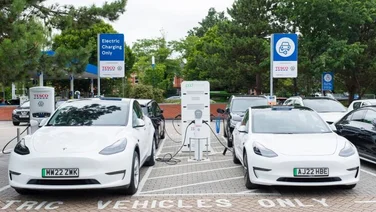- University of Salford finds that air source heat pumps cost £1.84 a day to run
- Heat pump users will have to adjust how they heat their homes to get full benefit
- Partners will now test in live conditions

Air source heat pumps can keep a home warm for less than £2 a day, according to a study from the University of Salford, housebuilders Bellwayy and Barret Redrow and construction solutions manufacturer Saint-Gobain UK and Ireland.
The Future Homes study took place at the Energy House 2.0 research facility at the University of Salford and found that air source heat pumps cost as little as £1.84 to run on a typical winter’s day, which makes them far more efficient than gas boilers, the most common method of domestic heating in the UK.
It was the largest ever controlled conditions research project on electrical heating systems. Carried out over 12 months, it saw tests conducted at both a typical UK winter’s day temperature of 5 degrees Celsius and -5 degrees Celsius.
Two air source heat pumps were tested, along with underfloor, infrared heating and ambient heating and mechanical heat ventilation.
If you want to know how much a heat pump will set you back, take a look at our heat pump cost calculator.
While the project showed that air source heat pumps are more cost effective than gas boilers, they also found that consumers would have to change how they use their heating systems in order to get the full financial benefit in extremely cold weather.
Gas boilers are designed to reach temperatures of to 70 degrees celsius quickly and be used for short periods of time that fit around a typical consumer’s lifestyle – early morning and late evening.
The tests showed that air source heat pumps do not work effectively when used in this way in -5 degrees celsius, and consumers would have to adjust the way they use their heating systems to heat their homes for under £2.
If you’re interested in learning more about the best air source heat pumps in the UK, please read our dedicated guide.
James Bursnell, head of innovation at Bellway said the project had “accelerated our understanding of how new homes can be heated” and explained that the next stage will see the partners “refine and test further” with “new technology on live developments”.
Mike Chaldecott, CEO of Saint-Gobain, said the way homes are built is “undergoing rapid change” and is moving away from carbon-intensive materials towards “more sustainable building solutions”.
He described the Future Homes study as “critical to understanding” how building sustainable and environmentally friendly homes can be done at scale.
Heat pumps will be critical to the UK’s efforts to get to net zero emissions, as will other low carbon technology (LCT), such as solar panels. According to the 2024 NHES, awareness of LCT is currently at 93%, but this isn’t necessarily translating into purchases.
One of the reasons behind this is a lack of awareness of the available government grants and initiatives that help with the upfront cost of LCT, such as the Warm Homes Plan and the Boiler Upgrade Scheme.
The government has made the environment a priority and is planning to make heat pumps compulsory in all newbuild housing by 2025. As of 2024, just 4.92% of newbuilds in the UK are built with a heat pump.






